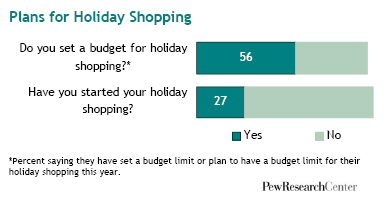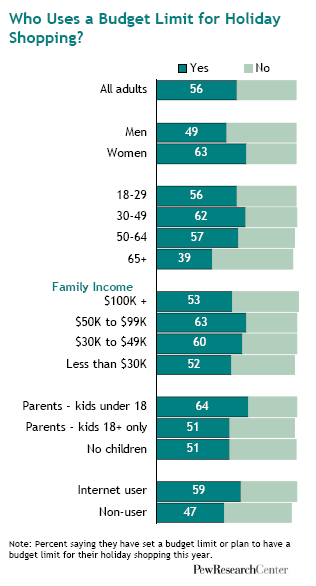 It’s that time of year again. Merchants are stocking the shelves and hoping for record sales. Forecasters are busy trying to figure out what to expect at the cash registers when the traditional start of the holiday shopping season arrives this weekend.
It’s that time of year again. Merchants are stocking the shelves and hoping for record sales. Forecasters are busy trying to figure out what to expect at the cash registers when the traditional start of the holiday shopping season arrives this weekend.
Once they do start flooding the stores, more than half of all adults (56%) say they’ll be working within a holiday shopping budget, while about four-in-ten (41%) say they’ll be winging it — shopping without a pre-set spending limit.
 For most Americans the heart of the holiday shopping season still lies ahead. Fewer than 3 in 10 (27%) adults have started their holiday shopping. The findings are from a Pew Research Center telephone survey among a nationally representative sample of 2,000 adults taken from October 18 through November 9.
For most Americans the heart of the holiday shopping season still lies ahead. Fewer than 3 in 10 (27%) adults have started their holiday shopping. The findings are from a Pew Research Center telephone survey among a nationally representative sample of 2,000 adults taken from October 18 through November 9.
Holiday Budgeting and Ease of Affordability
A majority of Americans say they set a budget limit for their holiday shopping; 56% have already set or plan to set a limit while 41% say they don’t use a budget limit for holiday shopping.
Women are more inclined than men to use a holiday budget. Fully 63% of women use a budget limit for holiday shopping, compared with 49% of men. Parents of minor age children (64%) are more likely than non-parents and those with adult age children to set a limit (51% each).
Younger and middle-aged adults are about equally likely to report using a budget limit for holiday shopping; older adults (ages 65 and older) are less likely to do so.
Regardless of whether or not respondents use a budget, a majority report that it is usually easy or very easy to pay for their holiday shopping. About one in five (21%) adults say it is usually very easy to pay for their holiday shopping; 51% say it is easy and 24% say it is difficult or very difficult to do so.
Not surprisingly, the less affluent are more likely to report difficulty paying the holiday bills. Fully 45% of those with incomes under $30,000 say it is difficult or very difficult to pay for holiday shopping; about half (48%) say it is easy or very easy to do so. By contrast, fewer than one-in-ten (9%) of those with incomes of at least $100,000 report difficulty paying for holiday shopping; 89% say it is easy or very easy to do so.
Who Are the Early Birds?
Most Americans have yet to begin their holiday shopping. Fewer than three-in-ten of Pew’s survey respondents interviewed in October (26%) and November (28%) have started their shopping. Groups more inclined to have started holiday shopping are: women—especially working women; parents of either minor or adult age children; the married; and those with family incomes at or above $30,000. Even so, in none of these groups has more than four-in-ten yet started their holiday shopping at this point in the fall.
While Internet shopping may seem like a procrastinator’s dream, internet users (30%) are a bit more likely than non-users (19%) to say they have started their holiday shopping. This pattern may be explained, in part, by the groups most likely to be on-line: namely younger and more affluent adults. Internet users under age 50 (28%) are more likely than their non-user counterparts (17%) to have started shopping. Those with less income to spare are both less likely to have started shopping and less likely to be internet users. Among those with family incomes of $30,000 and above, internet users are a bit more likely to have started shopping–33% have done so compared with 27% among non-users, but this difference does not reach levels of statistical significance.
About the Survey
Results for this survey are based on telephone interviews conducted with a nationally representative sample of adults, ages 18 years and older, living in continental U.S. telephone households.
- Interviews conducted Oct. 18 – Nov. 9, 2006
- 2,000 interviews, including 1,500 homeowners
- Margin of sampling error is plus or minus 2.5 percentage points for results based on the total sample at the 95% confidence level. The margin of sampling error is higher for results based on subgroups of respondents.
Survey interviews conducted under the direction of Princeton Survey Research Associates International. Interviews were conducted in English and Spanish.
Bear in mind that question wording and practical difficulties in conducting surveys can introduce error or bias in the findings of opinion polls.
Read the full report for more details.


